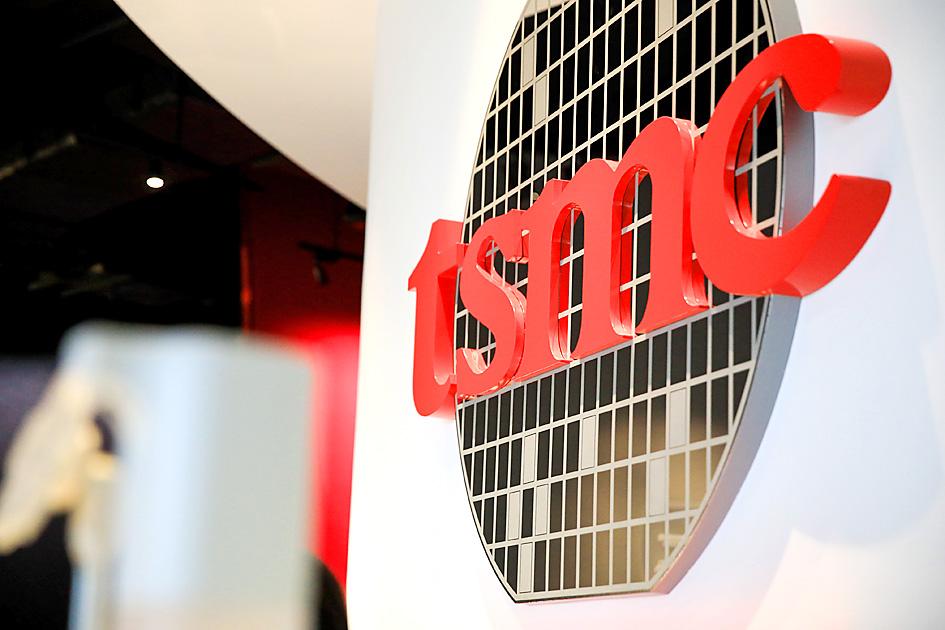Sales from Taiwan Semiconductor Manufacturing Co’s (TSMC, 台積電) largest customer grew to account for 26 percent of the chipmaker’s total revenue last year.
Although TSMC financial data did not specify the customer, analysts said they suspect it was Apple Inc.
TSMC’s largest customer contributed NT$405.4 billion (US$14.27 billion) to the chipmaker’s sales, up NT$68.63 billion or 20.37 percent from 2020.

Photo: I-Hwa Cheng, Bloomberg
That brought the largest customer’s share of TSMC’s sales to 26 percent, up from 25 percent a year earlier.
The data reinforced analysts’ suspicions that the customer is Apple, as revenue from its TSMC orders grew more than 20 percent from a year earlier.
TSMC’s consolidated revenue reached a record NT$1.587 trillion last year, up 18.53 percent from 2020, on the back of emerging technologies such as 5G and Internet of Things applications, high-performance computing devices and automotive electronics.
TSMC is believed to be the sole supplier of A-series processors for Apple’s iPhone line because of the chipmaker’s advanced 5-nanometer process, which is the latest technology the Taiwanese company has used for commercial production, analysts said.
Apple’s Mac and iPad lines have also used TSMC’s chips, analysts said.
Apple last week unveiled the M1 Ultra chip, which the company says is the next leap forward for its silicon program and the Mac.
Analysts said that TSMC is expected to benefit from the debut of the M1 Ultra chip this year.
Last year, TSMC’s second-largest customer contributed NT$153.74 billion to its sales, accounting for 10 percent of the chipmaker’s total, company data showed.
Analysts said they suspect the customer was Advanced Micro Devices Inc (AMD).
TSMC’s data indicated it was the first time sales from its second-largest customer rose to 10 percent of its total sales.
The US market was the largest buyer of TSMC’s chips last year, generating NT$1.01 trillion in sales, up 24 percent from a year earlier, and making up 64 percent of the chipmaker’s total.
That was followed by Taiwan, where the company generated NT$203.96 billion in sales, a 58 percent increase from a year earlier and accounting for 12.8 percent of TSMC’s total sales.
China was third, generating NT$164.55 billion in sales, down 29.6 percent from a year earlier and representing 10.3 percent of the chipmaker’s total sales, TSMC’s data showed.
Analysts said the decline in sales to China largely reflected Washington’s sanctions against Huawei Technologies Co (華為), which led to TSMC halting shipments to the Chinese firm.
TSMC said its 7-nanometer process created NT$440.38 billion in sales last year, up 11.5 percent from a year earlier, while the 5-nanometer process registered NT$262.33 billion in sales, up 188 percent from a year earlier. The technologies were the major sources of sales for TSMC.
TSMC is developing the more sophisticated 3 and 2-nanometer processes, and it is set to start mass production using 3-nanometer technology in the second half of the year.

South Korea’s equity benchmark yesterday crossed a new milestone just a month after surpassing the once-unthinkable 5,000 mark as surging global memory demand powers the country’s biggest chipmakers. The KOSPI advanced as much as 2.6 percent to a record 6,123, with Samsung Electronics Co and SK Hynix Inc each gaining more than 2 percent. With the benchmark now up 45 percent this year, South Korea’s stock market capitalization has also moved past France’s, following last month’s overtaking of Germany’s. Long overlooked by foreign funds, despite being undervalued, South Korean stocks have now emerged as clear winners in the global market. The so-called “artificial intelligence

NEW IDENTITY: Known for its software, India has expanded into hardware, with its semiconductor industry growing from US$38bn in 2023 to US$45bn to US$50bn India on Saturday inaugurated its first semiconductor assembly and test facility, a milestone in the government’s push to reduce dependence on foreign chipmakers and stake a claim in a sector dominated by China. Indian Prime Minister Narendra Modi opened US firm Micron Technology Inc’s semiconductor assembly, test and packaging unit in his home state of Gujarat, hailing the “dawn of a new era” for India’s technology ambitions. “When young Indians look back in the future, they will see this decade as the turning point in our tech future,” Modi told the event, which was broadcast on his YouTube channel. The plant would convert

‘SEISMIC SHIFT’: The researcher forecast there would be about 1.1 billion mobile shipments this year, down from 1.26 billion the prior year and erasing years of gains The global smartphone market is expected to contract 12.9 percent this year due to the unprecedented memorychip shortage, marking “a crisis like no other,” researcher International Data Corp (IDC) said. The new forecast, a dramatic revision down from earlier estimates, gives the latest accounting of the ongoing memory crunch that is affecting every corner of the electronics industry. The demand for advanced memory to power artificial intelligence (AI) tasks has drained global supply until well into next year and jeopardizes the business model of many smartphone makers. IDC forecast about 1.1 billion mobile shipments this year, down from 1.26 billion the prior

People stand in a Pokemon store in Tokyo on Thursday. One of the world highest-grossing franchises is celebrated its 30th anniversary yesterday.